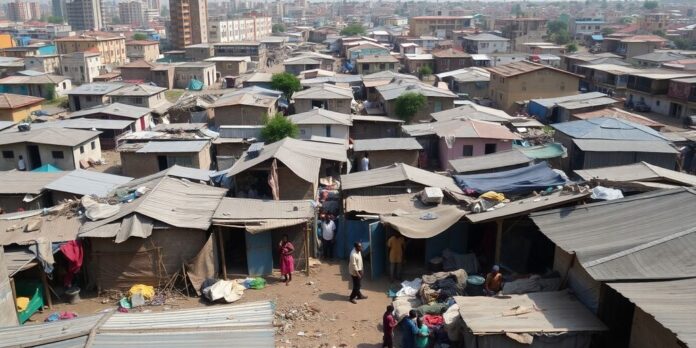In Abuja, the housing crisis is intensifying as economic pressures mount, with inflation rates soaring above 30%. Residents are grappling with skyrocketing rents and a severe shortage of affordable housing, forcing many into precarious living conditions. The situation has sparked widespread concern and calls for government intervention.
Key Takeaways
- Housing costs in Abuja have surged by over 50% recently.
- The city faces a housing deficit of approximately 1.7 million units.
- Inflation in Abuja has reached 32.9%, exacerbating the affordability crisis.
- Many residents are forced into substandard living conditions or homelessness.
Rising Rent Costs
The Federal Capital Territory (FCT) is witnessing an alarming increase in housing costs, with many residents unable to keep up with the rising rents. A two-bedroom apartment in the outskirts now averages between 800,000 and 1.5 million naira annually, while prime areas command even higher prices.
Landlords, facing their own financial pressures, have resorted to indiscriminate rent hikes, leaving tenants with little choice but to endure deteriorating living conditions. Many families are now trapped in a cycle of poverty, struggling to afford basic necessities while paying exorbitant rents.
Economic Strain and Inflation
The National Bureau of Statistics has reported that inflation in Abuja has surged to 32.9%, with food inflation slightly declining to 22.2%. Despite a national easing in inflation rates, the cost of living remains high, particularly in urban areas where many residents are feeling the pinch.
The economic strain is evident as families find it increasingly difficult to meet their housing obligations. The rising cost of living, coupled with stagnant wages, has left many residents in dire straits, with some resorting to informal settlements or even homelessness.
Government Response and Proposed Solutions
In response to the crisis, the Senate has proposed legislation to regulate rent payments, limiting advance payments to three months. Experts are advocating for increased investment in affordable housing and public-private partnerships to address the growing demand.
The FCT Minister has emphasized the need for development in satellite towns to alleviate pressure on the city center. Plans are underway to improve infrastructure and provide affordable housing options, but many residents remain skeptical about the implementation of these initiatives.
The Human Cost of the Crisis
The consequences of the housing crisis extend beyond financial strain. Many residents are forced to live in squalid conditions, exposing them to health risks and vulnerability to crime. Reports indicate that homelessness is on the rise, with individuals and families seeking shelter in abandoned buildings and under bridges.
A father of four shared his plight, stating, "This is where I live with my family. The condition is not encouraging, but this is the best we can afford for now."
Conclusion
As Abuja grapples with a worsening housing crisis amid economic turmoil, the need for urgent action is clear. Without effective government intervention and sustainable solutions, many residents may find themselves without a roof over their heads, further exacerbating the social and economic challenges facing the city. The time for action is now, as the future of countless families hangs in the balance.
Sources
- Abuja residents groan under high rent, The Nation Newspaper.
- Economic strain: Inflation surges above 30% in Abuja, 10 states, Punch Newspapers.


